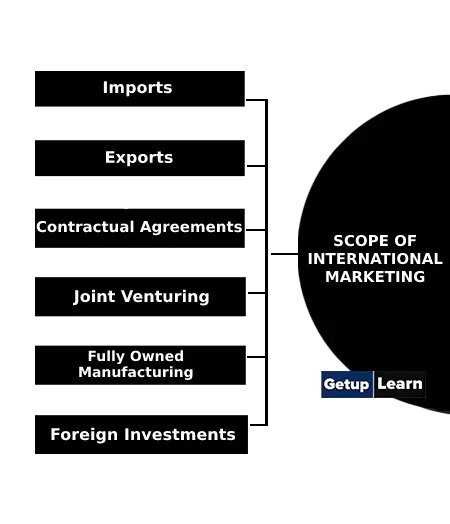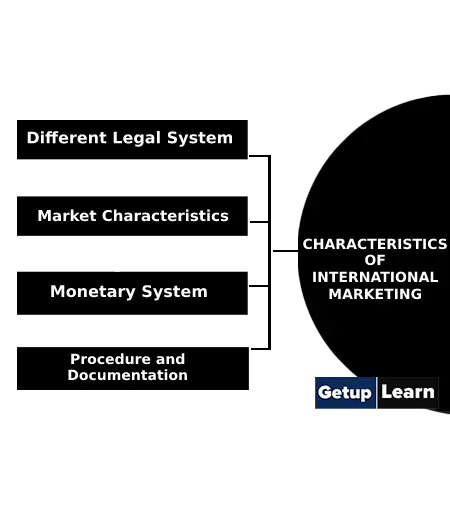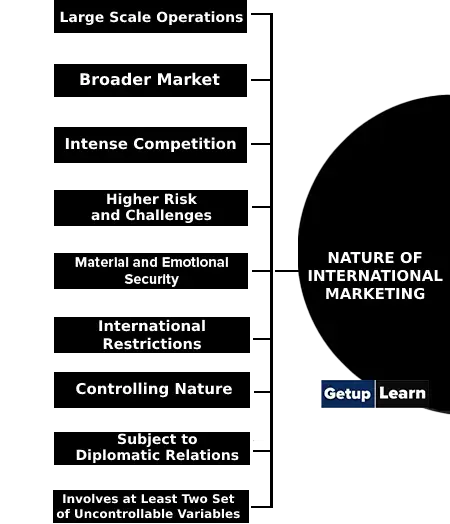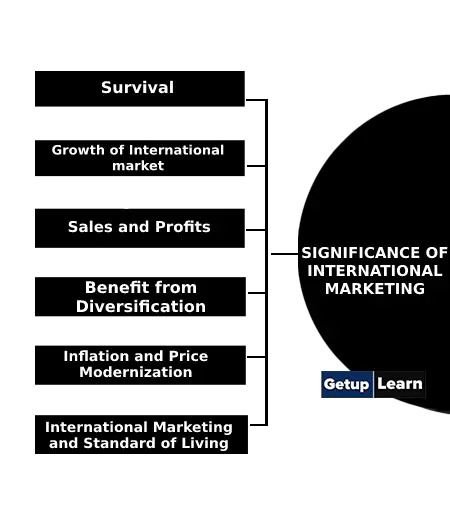Table of Contents
- 1 What is International Marketing?
- 2 Definition of International Marketing
- 3 Scope of International Marketing
- 4 Difference Between Domestic and International Marketing
- 5 Importance of International Marketing
- 6 Characteristics of International Marketing
- 7 Nature of International Marketing
- 8 Significance of International Marketing
- 9 Objectives of International Marketing
-
10 FAQ Related to International Marketing
- 10.1 What is the simple definition of international marketing?
- 10.2 What is the meaning of international marketing?
- 10.3 What is the scope of international marketing?
- 10.4 What is the importance of international marketing?
- 10.5 What are the characteristics of international marketing?
- 10.6 What are the nature of international marketing?
- 10.7 What are the significance of international marketing?
What is International Marketing?
International marketing refers to marketing carried out by companies overseas or across national boundaries. This strategy uses an extension of the techniques employed in the house country of a firm.
Whether an organization markets its goods and services domestically or internationally, the definition of marketing remains almost the same. However, the scope and importance of marketing are broadened when the organization decides to sell across international boundaries.
This is primarily due to the numerous factors that the organization has to take into consideration these include the geographical, economic, cultural, political and legal environment. It is important to understand that the marketing environment plays a great role in all businesses.
Definition of International Marketing
These are the simplest definitions of international marketing by Authors:
[su_quote cite=”American Marketing Association (AMA)”]International promoting is the international method of designing and the death penalty the conception rating, promotion and distribution of concepts, goods, and services to form exchanges that satisfy individual and organizational objectives.[/su_quote]
[su_quote cite=”Hess and Cateora”]International marketing is “the performance of business activities that direct the flow of goods and services to consumers or users in more than one nation.” It is different from domestic marketing in as much as the exchange takes place beyond the frontiers, thereby involving different markets and consumers who might have different needs, wants and behavioural attributes.[/su_quote]
[su_quote cite=”Kotler”]Global marketing is concerned with integrating and standardizing marketing actions across a number of geographic markets.[/su_quote]
[su_quote cite=”Terpstra and Sorathy”]International marketing consists of finding and satisfying global customer needs better than the competition, both domestic and international and of coordinating marketing activities within the constraints of the global environment.”[/su_quote]
[su_quote cite=”Cateora and Graham”]International marketing is the performance of business activities designed to plan, price, promote and direct the flow of a company’s goods and services to consumers or users in more than one nation for a profit.[/su_quote]
[su_quote cite=”Keegan”]Comprehends international marketing is going beyond export marketing and becoming more involved in the marketing environment in which it is doing business.[/su_quote]
Scope of International Marketing
Let’s discuss the scope of international marketing explained below:
- Imports
- Exports
- Contractual Agreements
- Joint Venturing
- Fully Owned Manufacturing
- Growth Opportunities
- Foreign Investments

Imports
This is the easiest form of International Marketing a company can get into importing from one country and selling in the domestic market. This is attainable solely in an exceedingly state of affairs wherever there’s demand within the domestic marketplace for foreign merchandise or services. Companies also localize the imported product depending on the needs of the market.
Exports
Opposite of importation and mercantilism, firms export their finalized product to international markets or on to their different franchises in far flung markets wherever they will sell the product to their localities for generating huge revenues.
Contractual Agreements
Whenever a business moves on the far side of its domestic boundaries, its scope of international marketing exposes it to greater chances of doing a lot more business. The market expands, the consumer base expands and even volumes and profits expand. Companies grow exponentially by going into written agreement agreements with many different partners overseas.
Joint Venturing
Two brands will close and enter a possible market. The investments, profit or losses are pre-decided in terms of both value and time period. At times it’s useful for firms to enter into a squad to raise the scope of international selling as a result of barriers to new entrants in foreign markets.
A local partner will sway be vastly helpful for doing business not solely operationally but conjointly from a domestic understanding of the market dynamics.
Fully Owned Manufacturing
With relatively a better level of engagement within the foreign soils, companies can own fully owned manufacturing in a country. The company will use this facility to sell products at intervals the country or export to close nations. Owning a totally owned production helps the firm’s management quality.
Growth Opportunities
There are lots of growth opportunities for both of the countries, developing and underdeveloping countries by trading with each other at a global level. The imports and exports of the countries grow their profits and help them to grow at a global level.
Foreign Investments
Foreign investment is an important part of international business. Foreign investment contains investments of funds from abroad in exchange for financial return. Foreign investment is done through investment in foreign countries through international business. Foreign investments are two types which are direct investment and portfolio investment.
Difference Between Domestic and International Marketing
Following are the points of difference between domestic and international marketing:
| Domestic Marketing | International Marketing |
| The activities of production, promotion, advertising, distribution, selling and customer satisfaction within one’s own country. | Marketing activities are undertaken across the globe. |
| There is less government influence. | Companies have to deal with the rules and regulations of various countries. |
| More reliance on indigenous technology. | There is an advantage that the business organizations can have access to the latest technology of numerous countries. |
| Cultural adjustment issues are less challenging. | Cross cultural adjustment issues are very challenging. |
| The risk factor and challenges are comparatively less in the case of domestic marketing. | The risk involved and challenges in the case of international marketing are very high due to some factors like sociocultural differences, exchange rates, setting an international price for the product and so on. |
| Requires less investment for acquiring resources and involves less research due to the familiarity of the market. | Requires huge capital investment and in depth research of the foreign markets. |
Importance of International Marketing
These are the importance of international marketing which explained below:
- Expand Target Market
- Boost Brand Reputation
- Connect Business with World
- Open Door For Future Opportunities

Expand Target Market
The target market of a marketing organization will be limited if it just concentrates on the domestic market. When an organization thinks globally, it looks for overseas opportunities to increase its market share and customer base.
Boost Brand Reputation
International marketing may give boost to a brand’s reputation. Brand that sold internationally is perceived to be better than the brand that sold locally. People like to purchase products that are widely available. Hence, international marketing is important to boost brand reputation.
Connect Business with World
Expanding business into an international market gives a business an advantage to connect with new customers and new business partners. Apple the tech giant designs its iPhone in California; outsources its manufacturing jobs to different countries like Mongolia, China, Korea, and Taiwan; and markets them across the world.
Apple has not restricted its business to a nation, but rather expanded it throughout the world. The opportunities for networking internationally are limitless. The more “places” a business is, the more connections it can make with the world.
Open Door For Future Opportunities
International marketing can also open door for future business opportunities. International marketing not only increases market share and customer base, but it also helps the business to connect to new vendors, a larger workforce and new technologies and ways of doing business.
For example, American organizations investing in Japan have found programs like Six Sigma and Theory Z which are helpful in shaping their business strategies.
Characteristics of International Marketing
These are the important characteristics of international marketing are as follows:

Different Legal System
Every country has its own legal system. Some countries follow English Common Law while others follow civil law. Some of the European countries are having their own legal system. This difference in the legal system among different countries increases the difficulties of businessmen.
It is not sure businessmen which legal system will be applicable to their business transactions. There must be uniform legal system. However, some of the agencies are trying to make it uniform for all countries.
The United Nations Commission on International Trade Law is also supporting the opinion of uniformity and is doing an effort to bring uniformity in International Trade Law.
Market Characteristics
The market characteristics of every country are different due to environmental factors, demand patterns, government controls, etc. In some countries like India and USA, the market characteristics are found different from state to state. It is because of all above factors responsible for the market characteristics.
Monetary System
The monetary system of each country is decided by the government of that country and the exchange value of the country’s currency is determined by the forces of supply and demand.
Procedure and Documentation
Every country has its own procedure of documentation requirements for the purpose of experts. Every business house has to comply with these rules and regulations for the purpose of exports and imports.
Nature of International Marketing
International marketing is the application of marketing principles by industries in one or more than one country. This is trading of goods and services among different countries.
The nature of international marketing can be summarized as follows:
- Large Scale Operations
- Broader Market
- Intense Competition
- Higher Risk and Challenges
- International Restrictions
- Controlling Nature
- Subject to Diplomatic Relations
- Involves at Least Two Set of Uncontrollable Variables
- Business Should Have Broader Competence

Large Scale Operations
International marketing consists of large-scale operations to be performed by businesses for promoting their products in many countries. It requires huge amount of labor and capital for meeting out the needs of large peoples at international level.
Broader Market
It provides wider platform for advertising products at an international level. Business can target their products among large populations residing in different nations. Marketing is not limited to any local area or nation but is free for all across the globe.
Intense Competition
International marketing faces an intense competition due to the presence of both domestic and international competitors. Organizations at a global level have to compete with both of these competitors which leads to stiff competition in international market.
Higher Risk and Challenges
Marketing at an international level involves a large amount of risk and challenges as it is dependent upon various factors and conditions. These risks arise due to political factors, cultural and regional differences, language barriers, changing styles and fashions of customers, sudden war or changes in government regulations.
International Restrictions
Organizations in international market need to follow all tariff and non-traffic constraints. There are various restrictions imposed due to differences in rules and regulations among nations at the global level. All nations perform import and export following the restrictions imposed in the international market.
Controlling Nature
The international market is dominated by developed countries and multinational corporations due to their global presence. Developed countries due to the presence of advanced technology and worldwide reach are able to perform business operations efficiently everywhere.
Subject to Diplomatic Relations
International marketing is subject to diplomatic relations between countries. Organizations enter into the international market of those countries with which their home country shares better cordial relations. There is no trade-in between the nations that have clashed with one another.
Involves at Least Two Set of Uncontrollable Variables
In domestic marketing, the marketers have to interact with only one set of uncontrollable variables. In international marketing, at least two sets of uncontrollable variables are involved or more if the marketing organization deals in more countries.
Business Should Have Broader Competence
Special management skills and broader competence is required in international marketing/business. An international marketing organization has to compete with both domestic competitors and international competitors. Hence, the competition is intense in international marketing.
Significance of International Marketing
The term International marketing refers to exchanges across national boundaries for the satisfaction of human needs and wants. International Marketing affects consumers in many ways, though its importance is neither well understood nor appreciated. Following are the significance of international marketing:
- Survival
- Growth of International market
- Sales and Profits
- Benefit from Diversification
- Inflation and Price Modernization
- International Marketing and Standard of Living

Survival
Most of the countries in the world are lacking market size, resources and opportunities. Therefore, it is their compulsion to trade with other countries for their survival. Since the European countries are small in size, without overseas markets, their firms would not have sufficient economies of scale to be competitive with US-based firms.
It is pertinent to mention here that international competition may not be a matter of choice when survival is at stake. Will Mitchell, J. Myles Shaver and Yeung Bernard conducted a study on “Performance Following Changes in International Presence in Domestic and Transition Industries.
Growth of International market
Despite having numerous problems like economic and marketing problems, developing nations are considered to be excellent markets to do business. The vast potential of international markets can never be ignored. According to one survey, the total world market is four times longer in comparison to the US market.
The slow growth of the US population and changing lifestyle viewed the growth of other markets with a critical eye. It is evident that Russian smokers show no concern about the health risks. And international giants Philip Moris Co., R.J. Reynolds, Tobacco International SA and British-American Tobacco Co. have entered the market very aggressively.
Sales and Profits
It is clear that there is a large potential to sell the products in the international market. The international market constitutes a large amount of share of the total business of many firms. Further, it is evident that many large US-based companies have performed very well in the overseas market. IBM and Compaq are the best examples in this regard.
Both of them have maximized their sales abroad in comparison to their domestic market. In the case of Coca-Cola, it is important to mention here that 80% of the total operating profit is contributed by the international sales account of the company.
Thus, the market is at a saturation level whereas there is still great potential for its future growth in other countries. Thus, it can be concluded that the international market provides huge potential to increase the sales value and profits of the firms.
Benefit from Diversification
Investors can be benefited from global diversification. It is evident that the demand for certain products is affected by cyclical factors like recession and seasonal factors like climatic change. The sale of such products fluctuates adversely due to all these variables.
It is the only solution for such kinds of risks to diversify a company’s risk and to consider the foreign markets as the only solution to overcome variable demand. Such markets can provide outlets for excess production capacity and can easily counter such fluctuations. Seasonal factors, for instance, may affect the consumption level of soft drinks.
And keeping in mind such limitation, the soft drink industries are spreading their marketing activities throughout the global market. It has been observed that global selling has enabled the company to carry on with production throughout the year and help the companies to stabilize their business.
Inflation and Price Modernization
The benefits of International trade are readily self-evident. Exports are always considered beneficial to a country. On the other hand, imports can also be highly beneficial to a country because there is not any incentive for domestic firms to moderate these prices.
The lack of alternatives in imported products may compel consumers to pay more for the products to local firms, resulting in inflation and excess profits for local firms.
International Marketing and Standard of Living
International marketing helps the countries and their citizens to increase their standard of living. On the other hand, without trade, there may be product shortages and which may force people to pay more or less. International trade make easy for industries to get specialization and gain access to raw materials.
And at the same time, it fosters competition and efficiency. Overall, it leads to the conclusion that international trade is helpful to provide their citizen higher standard of living.
Objectives of International Marketing
These are the objectives of international marketing:
- Bringing countries closer for trading purposes and encouraging large-scale free trade among the countries of the world and integration of economies of different countries and thereby facilitating the process of globalization of trade. For example, A free trade agreement (NAFTA) between the US, Canada and Mexico has removed most of the barriers to trade and investments . Most agreements are supplemental commitments on labour and the environment to encourage countries to upgrade their working.
- Establishing and strengthening trade relations among the nations and thereby to maintain cordial relations among nations for maintaining world peace.
- To facilitate and encourage social and cultural exchange among different countries of the world. For example in a country like India,, we love to consume Mexican, Chinese, and Italian food which is a fine example of socio- cultural exchange.
- To provide better life and welfare to people from different countries of the world. In addition, it provide assistance to countries facing natural calamities and other emergency situations.
- To provide assistance to developing countries in their economic and industrial growth and thereby remove the gap between the developed and developing countries.
- To ensure optimum utilization of resources (including surplus production) at the global level.
- To encourage world export trade and to provide benefits of the same to all participating countries.
- To offer the benefits of comparative cost advantage to all countries participating in international marketing.
- To keep international trade free and fair to all countries by avoiding trade barriers.
What is the simple definition of international marketing?
International promoting is that the international method of designing and death penalty the conception rating, promotion and distribution of concepts, goods, and services to form exchanges that satisfy individual and organizational objectives. By American Marketing Association (AMA)
What is the meaning of international marketing?
International marketing consists of finding and satisfying global customer needs better than the competition, both domestic and international and of coordinating marketing activities within the constraints of the global environment.
What is the scope of international marketing?
Following is the scope of international marketing:
1. Imports
2. Exports
3. Contractual Agreements
4. Joint Venturing
5. Fully Owned Manufacturing
6. Growth Opportunities
7. Foreign Investments.
What is the importance of international marketing?
Following are the importance of international marketing:
1. Expand target market
2. Boost brand reputation
3. Connect business with the world
4. open door for future opportunities
What are the characteristics of international marketing?
Following are the characteristics of international marketing:
1. Different Legal System
2. Market Characteristics
3. Monetary System
4. Procedure and Documentation.
What are the nature of international marketing?
Following are the nature of international marketing:
1. Large Scale Operations
2. Broader Market
3. Intense Competition
4. Higher Risk and Challenges
5. International Restrictions
6. Controlling Nature
7. Subject to Diplomatic Relations
8. Involves at Least Two Set of Uncontrollable Variables
9. Business Should Have Broader Competence.
What are the significance of international marketing?
Following are the significance of international marketing:
1. Survival
2. Growth of International market
3. Sales and Profits
4. Benefit from Diversification
5. Inflation and Price Modernization
6. International Marketing and Standard of Living.















